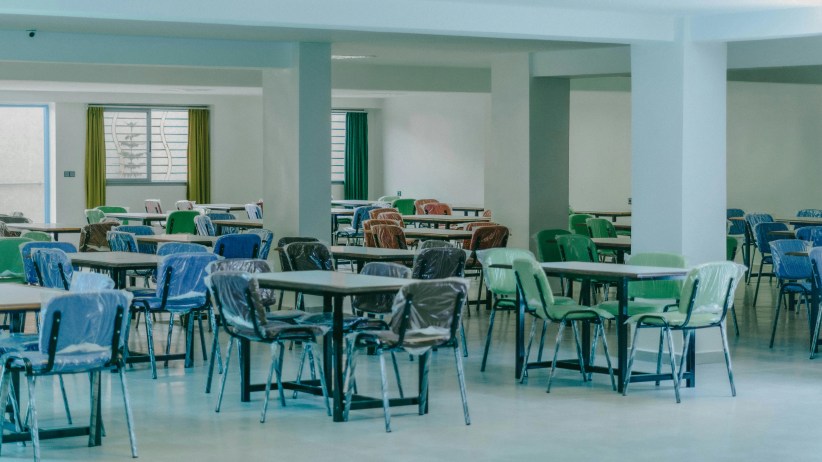Olivia wasn’t going! When she heard the words “math museum”, she envisioned endless pages of mind-numbing equations — certainly not her idea of a fun Girl Scout outing. Beth Deaner, director of the Goudreau Museum of Mathematics in Art and Science in New Hyde Park, personally intervened however, persuading Olivia over the phone to try the workshop, luring her with descriptions of hands-on projects involving puzzles and shapes. “Olivia became so engrossed, she was the last to leave,” Deaner recalls. “Here at the museum we encourage enthusiasm for math. When math is introduced in a positive, non-threatening environment, it doesn’t have to be a four-letter word.” At the Goudreau Museum, the formula adds up to fun. Founded over 20 years ago by the late Bernard Goudreau, an engineer and mathematics teacher, the museum has served as a haven for both students and teachers with an interest in mathematics. It reaches over 15,000 people annually through its special events, workshops and exhibitions. On weekends and school holidays, families can explore the museum’s extensive game and puzzle corner, which provides challenging problems for parents and children alike. The museum also hosts weekly workshops in unique topics you may not necessarily associate with mathematics. The younger set will delight in “Welcome to Mathmagicland”, a potpourri of activities that seem like magic, but are actually based on sound mathematical principles. A recent lesson on the fundamental mathematics behind baseball was followed by a trip to Shea Stadium. (The Mets actually won, demonstrating a statistical anomaly that made everyone very happy). Hands-on art workshops incorporate geometric insights about shape, balance, symmetry, reflection and the use of three-dimensional space. Classes focus on a wide range of subjects — from the intricate details of origami and the artwork of M.C. Escher, to the simple composition of a functioning paper airplane. Several workshops are presented by Long Island educators who teach at the SUNY/Old Westbury program for Gifted and Talented students. Topics include: Calculator Schmalculator, Numerical Puzzles and Diversions, and Super Math Olympiad Puzzles. “The only prerequisite for these lessons is motivation and excitement about math,” says Deaner. Workshops are also available for school and scout groups by appointment during weekdays. Sonia Ambarsom, a math instructor at the Garden School in Jackson Heights, became familiar with the museum through its teaching seminars. “The Goudreau Museum is a wonderful resource,” she says. “Its workshops provide teachers with valuable tools, enabling them to take math out of the textbooks and make it fun.” She has now incorporated an annual trip to the museum into her school curriculum. Eleven-year-old Claire Geist, a former student, looks forward to returning to the museum. “It was really interesting,” she says. During her visit she tackled logic problems with a team of friends. “The puzzles and games made you think. I definitely learned some new skills and it was fun to work together.” Exposure to different mathematical ideas helps build problem-solving skills. “At the museum, we integrate math into various disciplines, like art and science to spark insight,” says Deaner. “We want kids to realize there are many different types of arithmetic. A child struggling in one area of math may lose confidence, but we’ve discovered that the same child may excel in other areas of mathematics.” She recommends going to the library and exploring math-related books, like G is for Googal by David Schwartz, or Math Curse by Jon Scieszka. Students can also check out math websites — Cool Math 4 Kids (www.coolmath4kids.com) presents entertaining math games for children, while Math Forum (www.mathforum.com) provides a wealth of information for kids, parents and teachers. Mathematical principles surround us, permeating our daily activities. “It’s amazing what children will pick up if you provide the right connections,” Deaner says. Ambarsom suggests focusing on pattern recognition. “It’s a vital concept that’s employed even in more advanced high school math,” she says. “If children are exposed to these ideas at a younger age, it becomes second nature to them as they mature.” Many of the mental strategies and games taught at the museum can be used at home. “Try to play thinking games the whole family can be involved in,” Deaner says. “A night spent away from the TV or video games can help a child learn to focus and enjoy the quiet process of thought.”
Info: Where: The Goudreau Museum of Mathematics in Art and Science is located at the Herricks Community Center, 999 Herricks Road, Room 202, in New Hyde Park. When: Monday-Friday, 9am-5pm, by appointment. The museum is closed to the public during workshops. How much: $2 per person. For more info: (516) 747-0777; www.mathmuseum.org.
— Sarah-Beth White




















